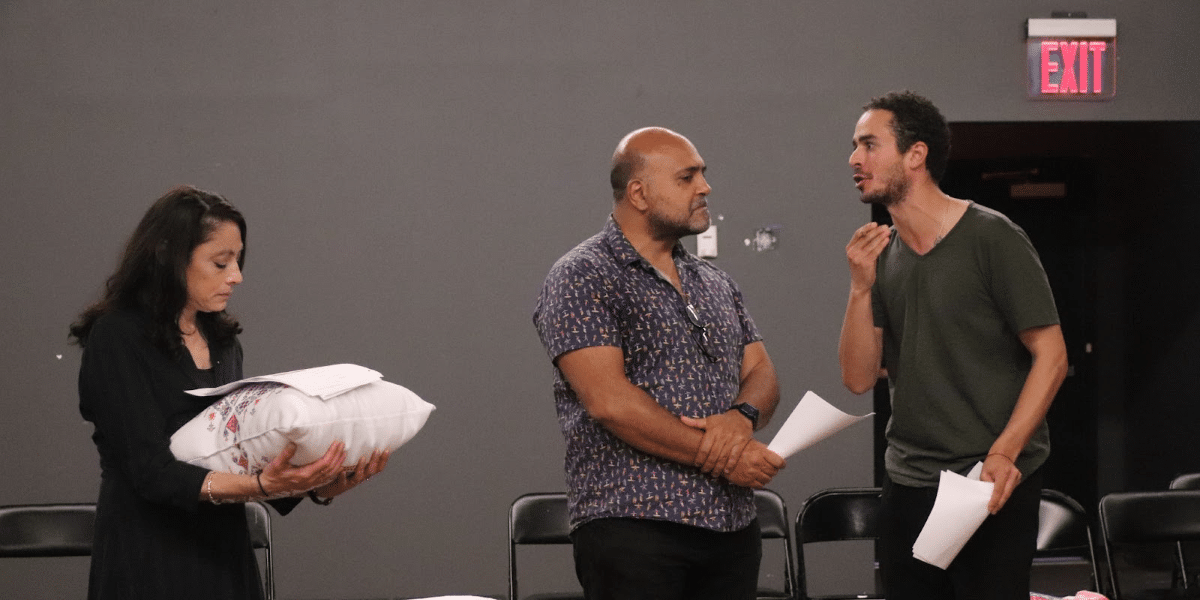By: James Manley
The Mulberry Tree, a deeply moving play set against the backdrop of Palestine in 1948, will have its world premiere at La MaMa ETC from October 10-20, 2024. Written by Hanna Eady and Edward Mast, and directed by Alexandra Aron, the play delves into the complexities of friendship, loyalty, and displacement during one of the tumultuous periods in Middle Eastern history. As 1948 marks the founding of the state of Israel, The Mulberry Tree brings to light the personal stories of two neighboring families—one Palestinian and one Palestinian
In a recent interview, the playwrights shared their inspiration for the story. “The play began when we came across some historical incidents and combined them with family stories from Hanna’s life growing up in a mixed Palestinian/Jewish village inside what is now Israel,” Mast explained. These intimate, personal histories helped to create a powerful narrative that speaks to larger socio-political movements without losing sight of the human stories at its core.
One of the poignant dynamics in the play is the friendship between a Palestinian boy and the village Rabbi. “This relationship is based on real events from Hanna’s own family,” Eady shared. “It provides an unexpected viewpoint on the events of 1948, reminding the audience that, before Zionism, Jews and non-Jews in Palestine were all Palestinians and all Arabs, living together for centuries.”
The themes of loyalty and betrayal resonate strongly throughout the play, as the playwrights explore how the Nakba—the mass displacement of Palestinians—and the founding of Israel affected these once peaceful communities. “We took an intimate approach to the play, examining how these major historical events impacted the two families in this village,” Mast said. “Ultimately, the concepts of betrayal and loyalty often depend on the power dynamics at play, and this has been true ever since the state of Israel was established.”
Despite the historical focus, The Mulberry Tree offers a timely reflection on current conflicts, both in the Middle East and beyond. “The challenges faced by the characters in the play still resonate today,” Eady pointed out. “We hope that audiences come away from the play with a
Having worked together for many years, Eady and Mast’s collaboration on The Mulberry Tree reflects the depth of their creative partnership. “We’ve developed a process of talking, writing, and revising that allows us to fully explore the story we want to tell,” Mast explained. “While it can sometimes take longer to reach a final text, we are always striving to ensure the characters speak for themselves.”

Director Alexandra Aron’s extensive experience with Palestinian theater artists helped bring authenticity and nuance to the production. “Alexandra has an incredible understanding of the cultural and historical context of the play,” Eady shared. “With her guidance, the actors have been able to fully realize the emotional depth and historical significance of their roles.”
The title of the play itself is laden with symbolism. The mulberry tree that grows across the wall separating the two families’ homes represents the enduring connections between them, even as political divisions arise. “The tree serves as a metaphor for hope and continuity,” Mast said. “In the 1940s, the young boy could climb from one yard to the other using the tree. When he returns to the village decades later, the people have been divided, but the tree still stands, taller than the wall between them.”
The Mulberry Tree arrives at a time when global attention is increasingly focused on the Israeli-Palestinian conflict. “The movement to free Palestine has gained significant momentum, with more people becoming engaged in the cause,” Eady noted. “This play offers an opportunity for audiences to reflect on the past while considering the present, fostering greater understanding and empathy for those affected by these conflicts.”
Tickets for The Mulberry Tree are available now, with performances running from October 10-20, 2024. A post-show discussion will follow the final performance on October 20, offering audiences an opportunity to further engage with the themes of the play. For tickets and more information, please visit La MaMa’s website.
Published By: Aize Perez


















